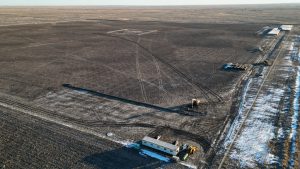A highly-contested Alberta Court of Appeal decision on random drug and alcohol testing between Suncor Energy Inc. and Unifor Local 707A could come down as early as December.
Edmonton labour lawyer Hugh McPhail QC with McLennan Ross, who served as legal counsel for the five industry associations with intervener status, said an appeals court decision judgement might come down in "a few weeks" but timing was at the discretion of the court.
The case is of national interest as random drug testing concerns the dual issues of an employee’s right to privacy versus the company’s right to ensure safe working conditions on sites that are considered dangerous.
"This is really about establishing the boundaries," said Larry Staples, P.Eng., and advisor to the Construction Owners Association of Alberta (COAA), one of the interveners. "We are trying to determine how strict our policies should be but at the same time not trespassing on and respecting the rights of our employees."
Cameron MacGillivray, president and CEO of intervener Enform, said: "Decisions by the court regarding the use of random alcohol and drug testing will have far-reaching implications for the Canadian upstream oil and gas industry’s ability to ensure a safe workplace."
Enform is composed of six trade associations representing all upstream aspects of the oil and gas industry.
They are the Canadian Association of Petroleum Producers, the Petroleum Services Association of Canada, the Canadian Association of Oilwell Drilling Contractors, the Canadian Energy Pipeline Association, the Canadian Association of Geophysical Contractors and the Explorers and Producers Association of Canada.
The appeal to the Alberta Appeal Court was heard Nov. 7 and was brought forward by Unifor Local 707A after Suncor scored a victory in the Alberta Court of the Queen’s Bench (supreme court) obtaining a decision that quashed an arbitration ruling from a panel of three that saw the majority (two panel members) strike down the company implemented random testing program for drugs and alcohol.
Prior to the appeal, five employer associations, who claim they will be significantly impacted by the outcome of the long-ranging dispute, were granted intervener status by the Alberta Court of Appeal.
The five associations who were granted status are the Mining Association of Canada, Construction Labour Relations — an Alberta Association, the Electrical Contractors Association of Alberta, Enform Canada and COAA.
"They collectively submitted that they will be directly and significantly affected by the outcome of the appeal and that they can provide the court with important and unique assistance in its deliberations," Madam Justice Marina Paperny ruled when granting and allowing them to file a 20-page factum outlining concerns.
The issue between the union and company began in 2012, the union maintains. Suncor unilaterally announced the implementation of random drug and alcohol testing in its oilsands operations. Unifor filed a grievance on behalf of its members claiming it violated their right to privacy. Arbitration resulted but not before the union successfully obtained an injunction against Suncor halting the testing.
In March 2014, after 23 days of hearings in 2013, the arbitration panel ruled that Suncor’s random testing program violated the employee’s right to privacy and could not be justified.
Suncor took the ruling for a judicial review before the Alberta Court of the Queen’s Bench with intervener status granted to the Mining Association of Canada and Enform in 2014. The Alberta Queen’s Bench decision came down in favour of the company and quashed the arbitration majority decision. The reasons are set out in the judgments and highlight the onus that exists for a company to strike a balance between respecting employee’s rights and providing a means of ensuring a safe work site.
Justice D.B. Nixon, in his reasons for judgement rendered in spring 2016, pointed to the 2013 Supreme Court of Canada (SCC) benchmark case involving the Communications, Energy and Paperworkers Union of Canada, Local 30 v. Irving Pulp & Paper Ltd. (known as Irving), which, along with other cases, reinforced the concept that a dangerous workplace does not automatically justify random testing. But, a balancing of safety issues versus employee rights is required.
"That balancing requires a determination of whether the rule sought to be imposed by the employer is proportionate to the concern it seeks to address," the justice ruled.
In the judicial review, Justice Nixon felt that two panel members did not properly consider evidence and their focus was too narrow, mainly on Unifor union members rather than considering the workplace as a whole. The Suncor program was camp wide and related to those positions that involved an element of danger.
Justice Nixon said in his reasons that while the SCC decision in Irving makes it clear that random testing is difficult to justify, the majority vote runs counter to a key statement in Irving which reads: "That is not to say that an employer can never impose random testing in a dangerous workplace. If it represents a proportionate response in light of both legitimate safety concerns and privacy interests, it may well be justified."
Justice Nixon maintains the majority vote on the panel fell into the trap of too strict adherence without considering Irving’s ruling, which argues for a case-by-case inquiry to determine if it can strike a balance between competing interests of privacy and safety in the workplace.
The court decided that the majority vote of the arbitrators was "unreasonable" and quashed its ruling, sending the issue back for a rehearing. However, before the case could be heard, the union announced it would appeal to the Alberta Court of Appeal and the five associations applied for intervener status.
This is the first of a two-part special to the Journal of Commerce that delves into the legal facets and differing opinions of a case that has national significance for construction. Industry stakeholders are watching intently to see what impact the decision could have on random drug and alcohol testing at work sites. Part two of this story will be featured in the Dec. 12 edition of the Journal of Commerce.











Recent Comments
comments for this post are closed